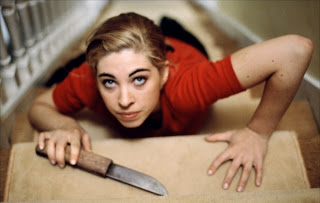Body dysmorphia. Existentialism. Cannibalism. Psychological disintegration. Identity crisis. Murder mysteries as musicals. French writer/director/actress Marina De Van makes downright provocative genre films. Her film work veers between enchantingly enthralling (8 Women) and brazenly confrontational (In My Skin). After making a name for herself as a regular collaborator with François Ozon (she’s starred in See the Sea and Sitcom, and she wrote 8 Women and Under the Sand), it was only a matter of time before De Van would branch out and into directing, with her own brand of fiercely intellectual and visceral cinema.
Born in 1971, De Van studied Philosophy at Sorbonne University before enrolling at the prestigious film school FEMIS. Here she would meet and befriend future filmmaker Ozon, forming a bond that would fertilise some of the most important and interesting films to ride the crest of the latest New Wave of French cinema.
Her own feature debut In My Skin, is an unsettling, Cronenbergian descent into one woman’s psychological break-down and body mutilation after she suffers a disfiguring accident that leaves a massive gash in her leg. The film is an early addition to the current trend of dark and aggressive genre cinema coming out of France at the moment. De Van approaches her philosophical concerns with scalpel precision. Her work falls firmly into the sub-genre of cinema du corps/cinema of the body/body-horror, and it is in this most unsettling field of horror where she contemplates her twisted preoccupations – mainly the increasing schism between mind, soul and body. In My Skin approaches this subject matter unflinchingly. The increasing dislocation the protagonist Esther (De Van) feels from her own body, is shot in unnerving close up and in a frank, matter of fact way. She soon becomes obsessed with opening the wound on her leg and creating new wounds all over her body. Before long she’s also ingesting slices of skin she removes from her own body. It wasn’t enough for De Van to write and direct this feverish nightmare of self-cannibalism, she had to star in it, too – further cementing her status as one of the most original and astounding French filmmakers of the last few years.
De Van’s interesting ideas of an individual becoming increasingly estranged from themselves, were taken to another level in her follow up film Don’t Look Back. Sophie Marceau portrays a fatigued writer whose first work of fiction is rejected by her publisher. She becomes increasingly cut off from her family and friends. She soon stops recognising her own face in the mirror and eventually sees those around her as being different looking too. She believes there is another world in the mirror, and before long she becomes the strange woman reflected back at her from the mirror (Monica Bellucci). Psychogenic fugue or eerie tale of possession – Don’t Look Back intrigues, chills and showcases De Van’s shrewd aptitude for spinning twisted, brain-teasing stories.
Born in 1971, De Van studied Philosophy at Sorbonne University before enrolling at the prestigious film school FEMIS. Here she would meet and befriend future filmmaker Ozon, forming a bond that would fertilise some of the most important and interesting films to ride the crest of the latest New Wave of French cinema.
Her own feature debut In My Skin, is an unsettling, Cronenbergian descent into one woman’s psychological break-down and body mutilation after she suffers a disfiguring accident that leaves a massive gash in her leg. The film is an early addition to the current trend of dark and aggressive genre cinema coming out of France at the moment. De Van approaches her philosophical concerns with scalpel precision. Her work falls firmly into the sub-genre of cinema du corps/cinema of the body/body-horror, and it is in this most unsettling field of horror where she contemplates her twisted preoccupations – mainly the increasing schism between mind, soul and body. In My Skin approaches this subject matter unflinchingly. The increasing dislocation the protagonist Esther (De Van) feels from her own body, is shot in unnerving close up and in a frank, matter of fact way. She soon becomes obsessed with opening the wound on her leg and creating new wounds all over her body. Before long she’s also ingesting slices of skin she removes from her own body. It wasn’t enough for De Van to write and direct this feverish nightmare of self-cannibalism, she had to star in it, too – further cementing her status as one of the most original and astounding French filmmakers of the last few years.
De Van’s interesting ideas of an individual becoming increasingly estranged from themselves, were taken to another level in her follow up film Don’t Look Back. Sophie Marceau portrays a fatigued writer whose first work of fiction is rejected by her publisher. She becomes increasingly cut off from her family and friends. She soon stops recognising her own face in the mirror and eventually sees those around her as being different looking too. She believes there is another world in the mirror, and before long she becomes the strange woman reflected back at her from the mirror (Monica Bellucci). Psychogenic fugue or eerie tale of possession – Don’t Look Back intrigues, chills and showcases De Van’s shrewd aptitude for spinning twisted, brain-teasing stories.



